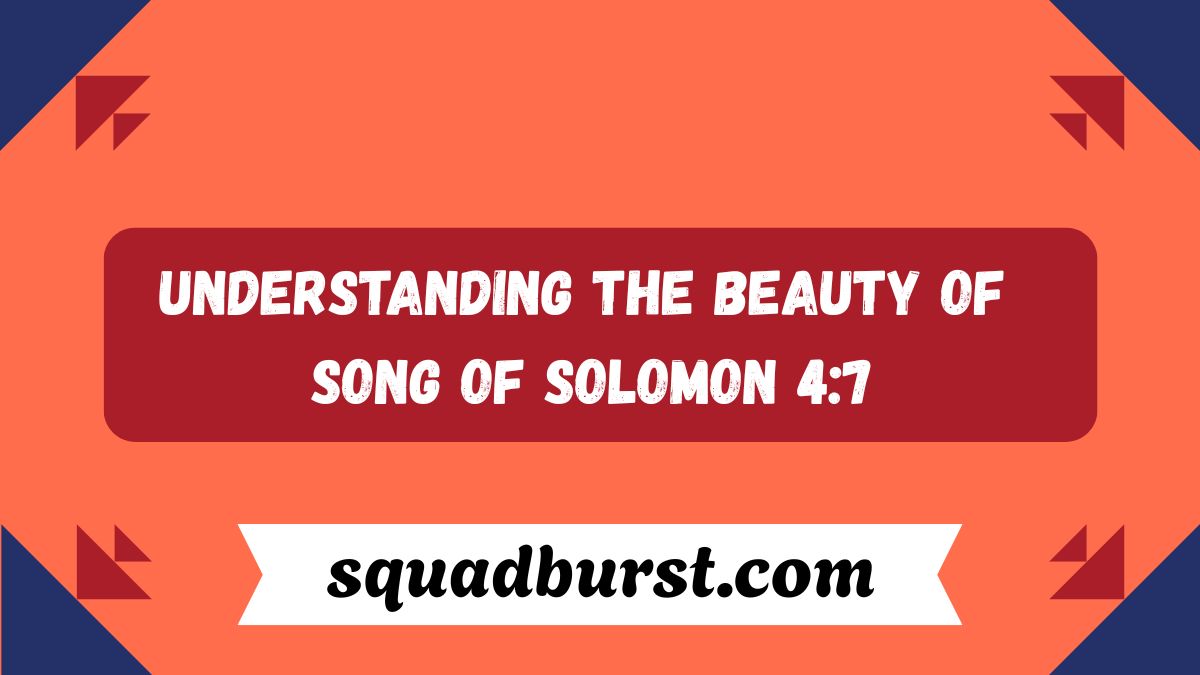Understanding the Beauty of Song of Solomon 4:7 means grasping the profound declaration “You are altogether beautiful, my darling; there is no flaw in you.” This powerful Bible verse reveals unconditional love that sees perfect beauty despite human imperfections. It represents both romantic intimacy and God’s divine love for believers.
Understanding the Beauty of Song of Solomon 4:7 Imagine someone looking at you and seeing absolute beauty—no criticism, no judgment, just pure admiration. Your scars become stories, your weaknesses transform into uniqueness, and your flaws disappear under love’s perfect gaze. This isn’t fantasy; it’s the reality of how divine love sees you every single day.
Understanding the Beauty of Song of Solomon 4:7 transforms marriages, builds confidence, and revolutionizes self-worth. This ancient Hebrew poetry speaks directly into modern insecurities and relationship struggles. When you truly comprehend these words, they reshape how you view yourself and others, creating deeper intimacy, stronger marriages, and unshakeable identity rooted in God’s unwavering affection.
The Context of Song of Solomon 4:7
Song of Solomon 4:7 sits nestled within a passionate love poem between a bride and groom. The speaker—traditionally understood as King Solomon—addresses his beloved with words that capture both physical beauty and something far more profound.
The verse appears in chapter 4, where Solomon describes his bride from head to toe. He compares her hair to goats descending Mount Gilead, her teeth to freshly shorn sheep, and her lips to scarlet thread. Then comes verse 7—the crescendo that declares her altogether beautiful with no flaw.
Historical Background
Ancient Hebrew poetry used intense imagery to convey emotion. The phrase “altogether beautiful” translates from the Hebrew kullak yaphah, meaning “all of you is beautiful.” The word yaphah doesn’t just mean attractive—it suggests radiance, excellence, and perfection.
The second part, “there is no flaw in you,” uses the Hebrew word mum, which typically described physical blemishes that disqualified animals from temple sacrifice. By declaring “no mum,” Solomon proclaims his beloved as perfect for love’s altar.
Literary Structure
Song of Solomon follows ancient Near Eastern wedding poetry traditions. Chapter 4 represents the wasf—a descriptive poem celebrating the beloved’s beauty. Verse 7 functions as the climactic summary, elevating the entire description to spiritual heights.
This structure matters because it shows intentionality. The poet builds methodically toward this declaration of flawlessness in love, making it the emotional and theological centerpiece.
Themes in Song of Solomon 4:7

Three powerful themes emerge from this remarkable verse, each offering insights into biblical love and spiritual beauty.
Unconditional Love
True love sees beyond surface imperfections. Solomon doesn’t claim his bride lacks physical flaws—he declares that in his eyes, she possesses perfect beauty.
This unconditional love mirrors God’s grace toward believers. Just as Solomon views his bride through love’s lens, God sees us through Christ’s righteousness. Our actual flaws don’t disappear, but love transforms how we’re perceived.
Key aspects of unconditional love:
- Focuses on the beloved’s value, not their failures
- Celebrates strengths while overlooking weaknesses
- Creates security through consistent affirmation
- Transforms both giver and receiver
The Apostle Paul later echoes this theme: “Love covers over a multitude of sins” (1 Peter 4:8). When we truly love someone, we choose to see their beauty rather than catalog their flaws.
Grace and Acceptance
Grace in relationships means offering what someone doesn’t deserve—complete acceptance despite imperfections. Solomon’s words demonstrate radical acceptance that doesn’t demand change before offering love.
This grace and acceptance creates transformation. When people feel truly accepted, they often become more beautiful, more confident, more loving themselves. Grace doesn’t ignore flaws; it loves through them.
Biblical examples of transformative acceptance:
- Jesus with the Samaritan woman (John 4)
- Paul’s encouragement to struggling churches
- David’s friendship with Jonathan despite family conflict
- Ruth’s loyalty to Naomi despite cultural barriers
Encouragement and Affirmation
Words possess creative power. When Solomon declares his beloved’s beauty, he doesn’t just describe—he creates reality through affirmation in relationships.
Encouragement and affirmation work like sunlight on plants. They help people grow toward their potential. Solomon’s words likely made his bride feel more beautiful, more confident, more radiant.
Research confirms what Scripture teaches: uplifting words from the Bible and positive affirmation literally change brain chemistry, boosting self-esteem and motivation.
Applications of Song of Solomon 4:7 Today
This ancient love poem offers practical wisdom for modern relationships and spiritual growth.
Seeing Others Through God’s Eyes
Seeing others through God’s eyes revolutionizes relationships. Instead of focusing on flaws, we learn to recognize inherent worth and potential beauty.
This shift requires intentional practice:
Daily exercises for seeing beauty:
- Look for three positive qualities in difficult people
- Speak words of affirmation before criticism
- Ask yourself: “How does God see this person?”
- Practice gratitude for people’s contributions
- Choose to notice growth rather than just problems
When we adopt God’s perspective, relationships transform. Marriages improve. Friendships deepen. Even challenging people become more bearable when viewed through love’s lens.
Embracing God’s Love for You
Many Christians struggle with self-worth in faith. They know God loves them intellectually but feel unworthy emotionally. Song of Solomon 4:7 offers powerful medicine for insecure souls.
God sees you as altogether beautiful. Not because you’re perfect, but because Christ’s love for the church covers your flaws with his righteousness. You are God’s beloved, chosen and cherished.
Practical steps for embracing divine love:
| Morning Affirmations | Evening Reflections |
|---|---|
| “I am God’s beloved” | “How did God show love today?” |
| “There is no flaw in me through Christ” | “What beauty did I see in myself?” |
| “I am altogether beautiful to God” | “How can I love myself better tomorrow?” |
Strengthening Marital Love
Marriage encouragement in scripture flows from understanding love’s true nature. Spouses who practice Song of Solomon 4:7 principles create thriving relationships.
Romantic love in scripture isn’t just emotion—it’s decision. Choosing to see your spouse as beautiful, speaking words of affirmation, and offering grace in relationships builds lasting intimacy.
Weekly marriage practices:
- Tell your spouse one thing you find beautiful about them
- Write encouraging notes and leave them to discover
- Practice forgiveness quickly and completely
- Celebrate small improvements and growth
Practical Tips for Living Out Song of Solomon 4:7

Transform this biblical truth into daily reality through specific actions and attitudes.
In Personal Growth
Faith and self-worth connect intimately. As you understand God’s view of you, self-confidence grows naturally.
Daily practices:
- Start mornings by reading affirmations from Scripture
- Replace negative self-talk with God’s declarations
- Keep a beauty journal noting positive qualities in yourself
- Surround yourself with people who speak life
- Practice gratitude for your unique gifts and abilities
In Marriage
Biblical relationship advice emphasizes building up rather than tearing down. Couples practicing Song of Solomon 4:7 principles report higher satisfaction and deeper intimacy.
Monthly relationship builders:
- Schedule regular affirmation sessions
- Create photo albums celebrating your spouse’s beauty
- Write letters describing what you love about them
- Plan dates that highlight their interests and strengths
- Practice physical and emotional intimacy regularly
In Friendships
Friends who see each other through God’s eyes create unbreakable bonds. Love and acceptance in the Bible model how friendships should function.
Friendship enhancers:
- Celebrate friends’ successes without jealousy
- Speak positively about absent friends
- Offer encouragement during difficult seasons
- Look for ways to highlight friends’ unique qualities
- Practice loyalty through life’s ups and downs
In Parenting
Children desperately need to feel altogether beautiful to their parents. Words shape identity, especially during formative years.
Parenting applications:
- Speak identity-building words daily
- Focus on character growth over performance
- Celebrate effort as much as achievement
- Help children see their unique beauty and gifts
- Model healthy self-love and acceptance
Biblical Cross-References
Song of Solomon 4:7 connects with numerous other Bible verses about beauty and divine love.
Old Testament Connections
Isaiah 62:3-5 describes Israel as God’s beautiful bride: “You will be a crown of splendor in the Lord’s hand, a royal diadem in the hand of your God… as a bridegroom rejoices over his bride, so will your God rejoice over you.”
Psalms overflow with declarations of God’s love: “How precious to me are your thoughts, God! How vast is the sum of them!” (Psalm 139:17).
Hosea’s marriage metaphor shows God pursuing unfaithful Israel with persistent love, declaring: “I will betroth you to me forever; I will betroth you in righteousness and justice, in love and compassion” (Hosea 2:19).
New Testament Fulfillment
Ephesians 5:25-27 explicitly connects marital love with Christ’s love for the church: “Husbands, love your wives, just as Christ loved the church and gave himself up for her to make her holy, cleansing her by the washing with water through the word, and to present her to himself as a radiant church, without stain or wrinkle or any other blemish, but holy and blameless.”
1 John 3:1 marvels at God’s love: “See what great love the Father has lavished on us, that we should be called children of God!”
Romans 8:38-39 declares nothing can separate us from God’s love—the ultimate expression of seeing us as altogether beautiful despite our flaws.
The Transformative Power of Divine Perspective

Song of Solomon 4:7 offers more than romantic poetry. It provides a lens for viewing ourselves and others that transforms relationships and builds confidence.
The beauty Solomon celebrates transcends physical appearance. It encompasses the whole person—spirit, soul, and body—seen through love’s perfect vision.
Love and grace in the Bible aren’t abstract concepts but practical realities that change how we live. Song of Solomon 4:7 reminds us that true beauty exists not in perfection but in being perfectly loved.
This ancient verse speaks into modern insecurities, relationship struggles, and spiritual doubts with timeless wisdom: You are beloved. You are beautiful. You are flawless in the eyes of perfect love.
Let these words shape your identity, transform your relationships, and deepen your understanding of God’s unconditional love. In a world obsessed with external beauty and performance, Song of Solomon 4:7 offers the security of being loved completely—flaws and all.
The next time you look in the mirror, hear criticism, or feel unworthy, remember Solomon’s declaration. More importantly, remember that these words ultimately flow from heaven’s heart to yours. You are altogether beautiful, and there is no flaw in you that love cannot cover.
conclusion
Understanding the Beauty of Song of Solomon 4:7 reveals God’s heart toward every believer. These ancient words still speak truth into our modern lives. You are beautiful in God’s eyes, not because you’re perfect, but because love sees beyond flaws. When you truly grasp this truth, it changes everything. Your relationships improve. confidence grows. Your ability to love others deepens. This isn’t just romantic poetry—it’s divine reality.
Understanding the Beauty of Song of Solomon 4:7 transforms how you see yourself and others. Start practicing these truths today. Speak affirming words to your spouse, children, and friends. Look in the mirror and remember you’re God’s beloved. Choose to see beauty instead of focusing on flaws. Let this verse guide your relationships and shape your identity. You are altogether beautiful, and there’s no flaw that love can’t cover.
FAQs
Q: What does “altogether beautiful” mean in Song of Solomon 4:7?
The Hebrew phrase means “completely beautiful in every way.” It describes seeing someone as perfect through love’s eyes, despite any flaws.
Q: Is Song of Solomon 4:7 only about romantic love?
No, it represents both human romantic love and God’s love for believers. Many scholars see it as a picture of Christ’s love for the church.
Q: How can I apply Song of Solomon 4:7 to my marriage today?
Speak affirming words to your spouse daily and choose to focus on their beauty rather than their flaws. Practice seeing them through God’s loving perspective.
Q: Does this verse mean we should ignore people’s actual flaws?
It means love chooses to see beauty first and covers flaws with grace. You acknowledge imperfections but don’t let them define how you view someone.
Q: How does Song of Solomon 4:7 help with low self-esteem?
It reminds you that God sees you as altogether beautiful through Christ. This divine perspective can transform how you view yourself and build confidence.

Emma Grace is a creative contributor to Squad Burst, blending her love for fashion and sports into captivating content. Her fresh perspective and relatable voice make her a favorite among readers who share her passion for style and athleticism.






